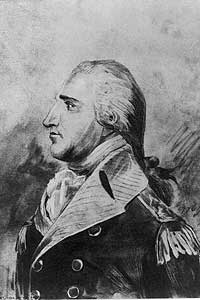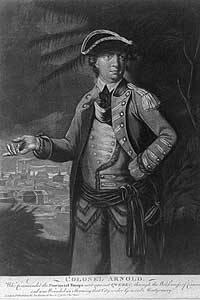Page content
Benedict Arnold in Williamsburg
- Skillful military strategist led key patriot attacks
- Sustained injuries in battle that caused his lifetime limp
- Defected and joined the loyalists in 1779
- Plotted to allow the British to take West Point
- Seized Williamsburg for two days in 1781
Early Life
Benedict Arnold was born in Norwich, Connecticut, on January 14, 1741. After an abbreviated academy education, he worked as an apprentice in an apothecary. He went on to open his own apothecary. Later, he became a successful merchant and ship’s captain. He married his first wife, Margaret Mansfield, in 1772. They had three sons before her death in 1775.
Patriot Career
In the beginning of the American Revolution, Arnold was an ardent patriot. A high-ranking figure, he distinguished himself as a skilled soldier and strategist. In 1775, he led the attack on Fort Ticonderoga in New York. Later that year, he sustained an injury to his left leg in an assault on the British in Quebec.
Upon recovery, Arnold continued to serve in the North. In August 1777, he helped lift the British siege of Fort Stanwix. He was instrumental in the defeat of General Burgoyne’s army at Saratoga, New York. There, his left leg was re-injured. He would walk with a limp the rest of his life.
A Change of Heart
General George Washington appointed Arnold as military commander in Philadelphia. It was there that Arnold began his break from the patriots. The Continental Congress had failed to promote him on several occasions, and he came to believe that most representatives were petty, bickering, incompetents.
By 1779, Arnold had grown disillusioned with the patriots. He felt that true liberty could only be secured by rejoining the British Empire, and he began to conspire with loyalists.
A Double Agent
Arnold pretended to remain loyal to the patriots, and he kept his command of the American fortifications at West Point, New York. He planned to betray the patriots by allowing the British to win West Point from him in an attack.
Before his plan could be realized, Major General Benedict Arnold learned that his British go-between, Major John Andre, had been captured. He quickly sought refuge with the British army in New York City. Andre was later hanged.
British Career
Arnold’s military instincts were now in the service of the loyalists. He was made a British brigadier general and led a small army to invade Virginia. In late December 1780, he sailed up the James River and seized Richmond.
In late March, 1781, British Major General William Phillips joined Arnold in Virginia with 2,000 additional troops. He combined them with Arnold’s army of 1,500 men. Phillips took charge, and Arnold was second in command. That April, Phillips and Arnold occupied Williamsburg for two days.
End of Life
Arnold continued to serve the British until 1781, when they were defeated at Yorktown. He moved to England with his second wife and children. At the end of his life, he was plagued by debt after a series of failed business ventures. He died in London in 1801.
Though he was an able strategist who fought with valor, Benedict Arnold’s reputation as a traitor was cemented when he plotted to allow West Point to fall to the British for the sum of £20,000. In a long and distinguished military career, his shift in allegiance stands out largest; and history has proven his betrayal as hard to forgive as to forget.



